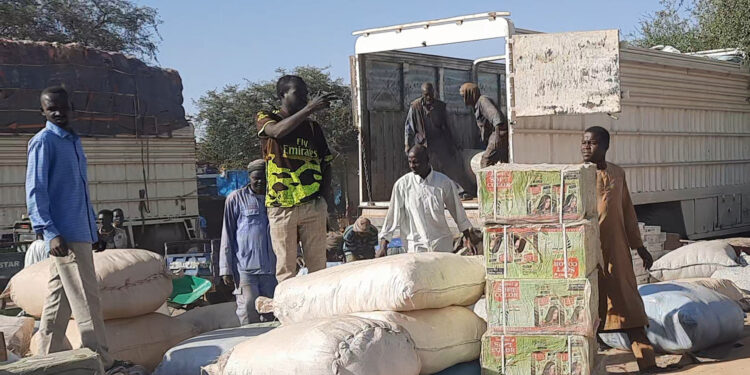12/1/2023–|Last updated: 12/1/202302:20 PM (Mecca time)
El Fasher- These days, the Darfur region in western Sudan is witnessing a state of commercial and economic deterioration. Due to the cessation of the movement of commercial convoys loaded with goods coming from Port Sudan to the region with the intensification of the war there, which made it difficult for commercial convoys to reach their intended destination, due to lack of security.
The commercial convoys coming to Darfur from Port Sudan, passing through the cities of Kosti and Al-Obeid to El-Fasher, are considered the mainstay of the commercial movement, as the cities of the region and via the continental road receive dozens of trucks loaded with goods and fuel, but today they are threatened by acts of looting and plunder, due to the war and the expansion of its area in Darfur and Kordofan.
Due to the escalating military developments between the army and the Rapid Support Forces in the region, the prices of basic commodities and fuel used have increased. Such as: automotive fuel in an unprecedented manner, with a scarcity of goods coinciding with the lack of financial liquidity among citizens, due to the closure of banks and the delay in paying government employee benefits for more than 7 months, which affected the economy and living conditions of citizens who have suffered poverty for many years, Because of the accumulated conflicts and crises.
Traders from the market in the city of El Fasher – Al Jazeera Net conducted interviews with them – believe that the prices of consumer goods rose during the month of last November compared to the previous few months, which witnessed a smooth movement of commercial convoys to and from the various cities of Darfur, under the protection and care of the joint force of the armed struggle movements. Which recently announced its departure from the principle of neutrality.
Merchants pointed to the high prices of daily supplies and the cutting of water and electricity supplies to the city, due to the fuel shortage, in addition to the high costs of transportation from the countries of Libya and Chad to Darfur in light of the fighting between the two parties.
Crazy rise in prices
Zainab, a housewife who came to the market, says, “The high prices are due to the scarcity of goods in the markets.”
It was reported that red meat prices recorded their highest level, with the price of a kilo of lamb exceeding 5,000 pounds, and 3,000 pounds for a kilo of beef, while the price of a 50-kg bag of sugar reached 85,000 pounds, and the price of a bottle of vegetable bean oil reached 35,000 pounds.
She pointed out that the reasons for this increase are due to the lack of imports and the lack of security at the present time, noting that vegetables and fruits, in addition to onions, that come from the east of the country have also witnessed a significant increase in prices, with scarcity and a decline in purchasing power in various markets.

Decline in purchasing power
Adam Ahmed Suleiman, professor of economics at El Fasher University, said in an interview with Al Jazeera Net, “The war in Sudan hinders the arrival of necessary goods to citizens, especially in El Geneina, Nyala, Zalingei, and finally the city of El Fasher.”
He added that this led to the cessation of agricultural and pastoral production facilities, in addition to the blocking of roads and the flow of humanitarian aid and medicines with high prices.
Adam stated that the complexities and security conditions on the continental road linking Khartoum and El Fasher made most people, especially merchants, spend long periods waiting for commercial convoys to arrive, with high transportation costs and the loss of livelihoods for many citizens.
Adam continued that the expansion of the war in Darfur caused a decline in purchasing power and the state’s role in providing basic services to citizens, in addition to the cessation of production, inflation, and an increase in the level of the official currency exchange rate, as the dollar exceeded 100 pounds in light of the flight of local and foreign investments to neighboring countries. Such as: Chad, Ethiopia, and Egypt.

The El Fasher Stock Exchange declined
Suleiman Muhammad Al-Douma, General Supervisor of the Commodity Stock Exchange in North Darfur, said that the city’s stock exchange has witnessed a noticeable decline recently, due to the ongoing war in the country.
He told Al Jazeera Net, “In the past, the city of El Fasher received between 50 and 60 commercial goods trucks a day, while it has completely stopped these days, due to the expansion of the fighting.”
He added that the commercial raft had a great role in stimulating commercial and economic activities during the past 7 months, but after the escalation and security tensions, stopping the arrival of trucks to Darfur caused a scarcity of food and other goods.
For his part, Adam Othman Siddiq, head of the Chamber of Commerce in one of the city’s markets, expressed his expectation that there will be an increase in commodity prices in the coming days if goods do not arrive from Port Sudan, east of the country.
Adam Othman told Al Jazeera Net, “The living situation is not hidden from anyone, especially in light of the lack of oversight and control over the markets and the greed of merchants.”
He added, “Most goods have run out of stores, and most merchants moved their goods from the markets to other, safer places, while others took refuge in neighboring countries, including merchants in the cities of Nyala, El Geneina, and Zalingei.”
Adam believes that the state is now completely devoid of strategic food reserves, which will exacerbate this situation in the coming days.



